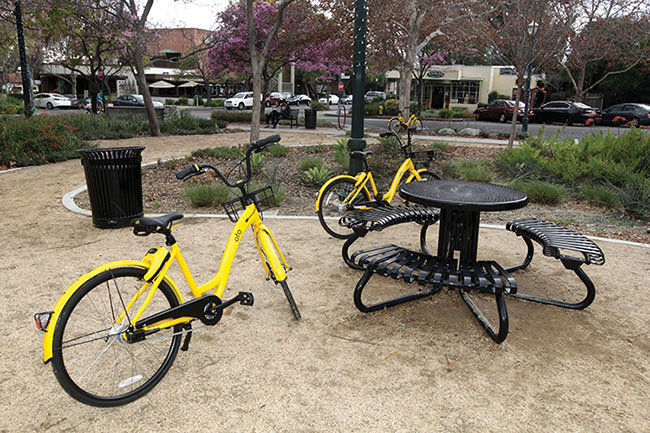Council affirms rules for bike and scooter rentals

Bikes belonging to the Chinese Company Ofo sit abandoned in Shelton Park in June 2018. In September 2018 the City Council passed an emergency ordinance regulating shared mobility companies like Ofo. Last Tuesday the council made that ordinance permanent. Courier photo Steven Felschundneff
by Steven Felschundneff | steven@claremont-courier.com
The Claremont City Council authorized a program last week to regulate the operation of “micro-mobility” vehicles including scooters, push bikes and electric bicycles within the city.
By a unanimous vote the council ended a pilot program, which was scheduled to sunset in August, and made the shared mobility ordinance a permanent part of the city’s municipal code.
In 2017 and 2018 bike and scooter sharing companies started to spring up throughout the country, particularly in congested urban areas. The now familiar concept revolved around using a smart phone to rent these wheeled devices for a quick trip rather than walking. When finished, riders simply left the vehicles on the sidewalk for the next user.
The rental scooters and bikes were touted as fulfilling the “last mile” portion of public transportation, getting a person from a train or bus station to their final destination. But some critics decried a downside, with bikes and scooters littering streets, sometimes abandoned in remote areas or vandalized beyond repair, even resulting in waste and the potential for environmental harm, according to the University of Michigan’s Journal of Law and Mobility.
“Electric scooters in particular have drawn considerable attention and controversy regarding safety and enforcement, and in other cities, the proliferation of scooters has resulted in litigation,” according to a City of Claremont staff report. “The Claremont Colleges and the Village merchants have shared concerns with scooters and other rolling devices on Village sidewalks.”
In February 2018 Pomona College, then later Pitzer College, partnered with Ofo, a Chinese company, to provide bicycle use to students and faculty. Before long, the distinctive yellow electric bikes seemed to be everywhere in town, often far from the Colleges.
In September 2018 the city passed an urgency ordinance declaring a temporary moratorium on the establishment and operation of any electric scooter rental business in Claremont. By October Ofo ended its contract and picked up its bikes.
The council asked city staff to draft the shared mobility ordinance, which it passed in June 2020. That ordinance outlined regulations, licensing, and prohibitions for micro mobility businesses, including forbidding the abandonment of scooters and bikes.
During the three years of the pilot program the city did not receive any applications to operate a shared mobility business in Claremont, according to the staff report.
In a nutshell, the now permanent ordinance prohibits any company from renting any “mobility device” in Claremont without a license; dropping, abandoning, parking, or leaving one of these vehicles for any length of time in a public area, specifically when it blocks a path of travel such as a sidewalk; or operating the mobility device above the posted speed limit on a street or at more than five miles per hour in a public park.
Businesses wishing to offer rental scooters or bikes are required to obtain a license from the city. That license requires vehicles be maintained and safe; limits the number of mobility devices the company can offer for rent, a stipulation designed to avoid oversaturation and possible impact on public health, safety, and welfare; that an operator must have rules and staffing to ensure the bikes or scooters are not abandoned and will have at least one employee available 24 hours-a-day, seven days-a-week to respond to city concerns.
Finally, the scooters and bikes could not be operated in any “restricted area” within the city, but the ordinance did not define areas that would be off limits. According to City Attorney Alisha Patterson, the City Council or community development director could designate an area as restricted if that became necessary in the future.
Personal electric scooters and bicycles are exempt from the ordinance, as are wheelchairs or other mobility devices used by persons with disabilities.
With or without scooter rentals in Claremont, the final mile concept remains an opportunity, and a potential obstacle, for effective public transportation. To partially address that, the council also authorized staff last week to continue its work with the San Gabriel Valley Council of Governments in implementing a bike share program in Claremont.
The San Gabriel Valley Council of Governments has been working on a regional e-bike sharing program since August 2017, after it received $4.6 million from California’s greenhouse gas reduction fund. That program, run by Gotcha Media Holdings, was scheduled to begin in March 2020 but was delayed by the pandemic until summer 2020.
E-bikes are powered by pedaling, just like a standard bike, but have strong battery powered motors that make them easier to ride and faster. They come in various classes, from those that must be pedaled at all times (Class 1), to those that operate more like a motorcycle with a throttle and no requirement that the rider pedal (Class 3).
“However, like most bike share programs nationwide, ridership was low and it was difficult for operators to cover their true operational costs,” read the staff report. “This resulted in the halted operations of many programs across the country, and resulted in the dissolution of Gotcha in January 2021.”
San Gabriel Valley COG relaunched the bike share concept in September 2021 with a focus on residents most likely to use e-bikes to replace car trips, including college students, employees at large businesses, and those who had already expressed an interest.
The new program, called GoSGV, allowed users to have exclusive access to an e-bike that was rented for a monthly fee. At the September 2022 launch, 840 Class 1 bikes were placed into service, including 12 cargo bikes that allowed users to haul a sizable payload. Currently, 150 of these bikes are in use throughout the region including three in Claremont.









0 Comments